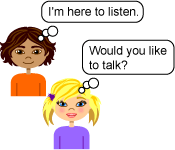|
|
|
|
|
EMPATHY
Back to top
HOW CAN I TELL IF SOMEONE IS FEELING BAD?
Empathy is the ability to notice that another person is upset, or feeling bad, or to imagine how that
person may be feeling. Emotional empathy has to do with the ability to feel the way someone else is
feeling. If your friend were upset, you would feel upset if you were empathetic. Cognitive empathy
has to do with perspective taking. If you could understand why your friend was angry about
something that had happened, you would have good cognitive empathy even if you didn't agree that
anger was an appropriate way to feel in that particular situation.
Some signs that a person needs an empathetic listener:
| Face appears stressed
|
Muscles look tight
|
| Standing alone, away from the group
|
Grouchy, irritable, or sad appearing
|
 Back to top
Back to top
HOW HARD WOULD IT BE FOR ME TO HELP?
Empathy is s complex skill so although it can be learned, it may not be easy to learn. It is easier to be
empathetic toward our family and friends, but it is especially difficult to be empathetic toward
strangers. First, empathy requires listening really closely to the other person, rather than telling the
other person what to do. Second, empathy means showing the other person you understand. Third,
empathy takes time. You need to spend time with the person who needs empathy. It is easier for
some people to be empathetic than for others. It is hard for people who are shy or nervous to be
empathetic although they may want to help others. The good news is that being thoughtful,
empathetic, and kind to someone makes you feel good too.
Back to top
WHAT MIGHT BE HELPFUL?
- Reading stories about people who are having difficulty will help you understand how others may be feeling.
- When you see someone who is different in some way from you, try to think about how that person might be similar to you.
- Don???t ignore a person who seems to be alone, even something as simple as a smile might be helpful.
- Tell yourself that you are a kind person and that being a kind person is important.
- Try to do something kind when you see someone standing alone, or someone who appears upset, or someone who seldom gets a "thank you."
- Practice listening to others without interrupting, without telling your ideas, and without talking about yourself.
- When you have difficulty understanding how someone else is feeling, think of a time you were in a similar situation and how you felt at that time.
- When listening, lean forward and nod your head now and then.
- Ask the person, ???What do you need???? ???What can I do to help????
- Say to the person, "I am listening, I am trying to understand how you feel."
Back to top
WHAT MIGHT NOT BE SO HELPFUL?

- It is not helpful to be thinking about what you want to say when you need to be listening to the person who needs empathy.
- It is not helpful to tell the person about something that happened to you.
- It is not helpful to give advice when someone needs to share his/her story or concerns.
- When you can???t seem to really ???tune in??? to how the other person is feeling, don???t discount the person???s feelings as if they are not important.
- Don???t walk away when someone needs your attention unless you are going to find someone else who can be helpful.
- If you are very concerned about the person, be sure to let an adult know who has the training to help; i.e., your school counselor/psychologist, your teacher, or your parents.
Disclaimer: Material in Whyville's Wellness Center is intended as general information. It is not a recommendation for treatment,
nor should it be considered medical or mental health advice. Whyville's Wellness Center urges families to discuss all information
and questions related to medical or mental health care with a health care professional.
|
|
|
|
|